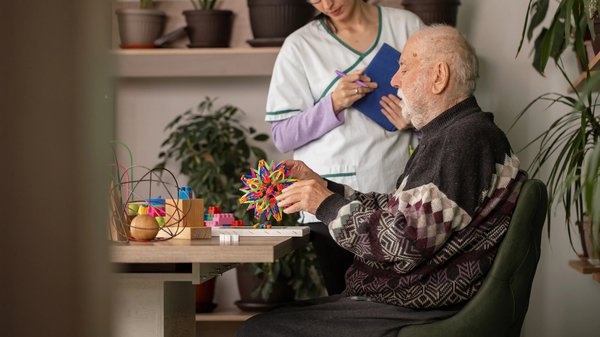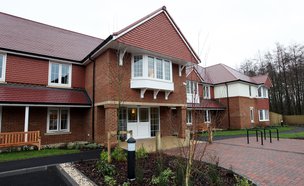Need some help finding dementia care near you?
TrustedCare is a comprehensive directory and referral service for CQC registered homes and home care providers that provide dementia care throughout the UK.
Simply select the type of care service you require from the menu above and enter your location to start the search for homes or home care providers that offer dementia care near you.

Featured Dementia Care providers
-
20
Abbeycrest Nursing Home
Reading
4.6 out of 5.0
4 reviews
Call provider 0118 207 2499
Price on enquiry
-
7
-
18
Cherry Blossom Manor Care Home
Tadley
5.0 out of 5.0
4 reviews
Call provider 01256 595278
Price on enquiry
Are you looking for Dementia care services?
Call the our specialist Care Adviser team who can help identify dementia care services in your area or answer any questions you have.
Call us on 01865 638014
Send messageSpecialist Dementia Care
Dementia care provides specialist support to those who are suffering with dementia and require some extra assistance. Support for Dementia can either be provided in the comfort of the individuals own home, or in a care/nursing home. People who suffer with dementia require more care and support as their symptoms progress.
The benefits of finding a suitable dementia home for your loved one are plentiful. Not only will they be provided with 24 hour care and support from staff, but also a safe environment and they will have the option to engage in social activities with fellow residents.
Before moving into a home, an assessment will be carried out on your loved one by Social Services. They will determine whether your loved one would benefit from being moved into a care home. Should they believe that this is the best option, the next step will be to have a financial assessment which will uncover whether your loved one is eligible for any funding from the Council.
Dementia Care in the following locations
- Dementia Care in Northamptonshire
- Dementia Care in New York
- Dementia Care in Worcestershire
- Dementia Care in Barnsley
- Dementia Care in Barnstaple
- Dementia Care in Basildon
- Dementia Care in Basingstoke
- Dementia Care in Bath
- Dementia Care in Berkshire
- Dementia Care in Bexhill
- Dementia Care in Birkenhead
- Dementia Care in Birmingham
- Dementia Care in Bolton
- Dementia Care in Bournemouth
- Dementia Care in Bracknell
- Dementia Care in Bradford
- Dementia Care in Brighton
- Dementia Care in Bristol
- Dementia Care in Bromley
- Dementia Care in Burnley
- Dementia Care in Cambridge
- Dementia Care in Canterbury
- Dementia Care in Cardiff
- Dementia Care in Carlisle
- Dementia Care in Chatham
- Dementia Care in Chelmsford
- Dementia Care in Cheltenham
- Dementia Care in Cheshire
- Dementia Care in Chester
- Dementia Care in Chichester
- Dementia Care in Colchester
- Dementia Care in Coventry
- Dementia Care in Derby
- Dementia Care in Dudley
- Dementia Care in Durham
- Dementia Care in East Sussex
- Dementia Care in Eastbourne
- Dementia Care in Eccles
- Dementia Care in Edinburgh
- Dementia Care in Ely
- Dementia Care in Essex
- Dementia Care in Exeter
- Dementia Care in Gillingham
- Dementia Care in Gloucester
- Dementia Care in Gloucestershire
- Dementia Care in Grantham
- Dementia Care in Guildford
- Dementia Care in Harrogate
- Dementia Care in Hastings
- Dementia Care in Hereford
- Dementia Care in Hertfordshire
- Dementia Care in Hoddesdon
- Dementia Care in Horsham
- Dementia Care in Huddersfield
- Dementia Care in Hull
- Dementia Care in Ipswich
- Dementia Care in Kent
- Dementia Care in Kingston
- Dementia Care in Lancaster
- Dementia Care in Leeds
- Dementia Care in Leicester
- Dementia Care in Lincoln
- Dementia Care in Liverpool
- Dementia Care in London
- Dementia Care in Luton
- Dementia Care in Maidstone
- Dementia Care in Manchester
- Dementia Care in Middlesbrough
- Dementia Care in Milton Keynes
- Dementia Care in Newcastle
- Dementia Care in Newton Abbot
- Dementia Care in Northampton
- Dementia Care in Norwich
- Dementia Care in Nottingham
- Dementia Care in Ormskirk
- Dementia Care in Oxfordshire
- Dementia Care in Oxford
- Dementia Care in Peterborough
- Dementia Care in Plymouth
- Dementia Care in Poole
- Dementia Care in Portsmouth
- Dementia Care in Preston
- Dementia Care in Reading
- Dementia Care in Rochdale
- Dementia Care in Rochester
- Dementia Care in Rotherham
- Dementia Care in Rugby
- Dementia Care in Runcorn
- Dementia Care in Salford
- Dementia Care in Salisbury
- Dementia Care in Sheffield
- Dementia Care in Slough
- Dementia Care in Solihull
- Dementia Care in Somerset
- Dementia Care in Southampton
- Dementia Care in Southend
- Dementia Care in St Albans
- Dementia Care in Stafford
- Dementia Care in Stockport
- Dementia Care in Stoke on Trent
- Dementia Care in Stroud
- Dementia Care in Suffolk
- Dementia Care in Sunderland
- Dementia Care in Surrey
- Dementia Care in Sussex
- Dementia Care in Swindon
- Dementia Care in Teignmouth
- Dementia Care in Tonbridge
- Dementia Care in Wakefield
- Dementia Care in Walsall
- Dementia Care in Warrington
- Dementia Care in Warwickshire
- Dementia Care in Watford
- Dementia Care in West Midlands
- Dementia Care in West Sussex
- Dementia Care in Weston Super Mare
- Dementia Care in Wigan
- Dementia Care in Wiltshire
- Dementia Care in Winchester
- Dementia Care in Wolverhampton
- Dementia Care in Worcester
- Dementia Care in Worksop
- Dementia Care in Worthing
- Dementia Care in York
- Dementia Care in Westminster
- Dementia Care in Blackpool
Understanding Your Dementia Care Options
There are different types of home that may be suitable for individuals with dementia, dependent on care needs. Residential care homes are able to assist people with daily tasks, such as: washing, dressing, eating, prompting to take medication and support mobilising. Whereas nursing homes support people with more complex care needs that require the support of a registered Nurse. Specialist nursing dementia care is normally referred to as EMI care (Elderly, Mentally Infirm) and support is provided in dedicated EMI units within the nursing home. EMI beds can be available in some residential and nursing homes. All of these types of home will have staff who are trained in supporting people with dementia.
It is also possible for individuals to have dementia care provided to them in the familiar setting of their own home. They will receive practical support as well as constant reassurance from caregivers who are fully trained to support people living with dementia. Before a package of care can begin, a full home assessment will be carried out at your loved ones home which will enable the home care provider to create a care plan tailored to their personal needs.
Each comprehensive profile on Trusted Care's website is designed to save you time when researching dementia care near you, providing the critical information you need to make an informed decision about the best care home or home care option for you or someone you love.
If you are looking for further advice or guidance on dementia care, please view some of our useful articles below or contact one of our specialist Care Advisers.
Help & advice
-
Care Home Costs Explained
It is essential to be practical when financing care, particularly due to the significant cost variations among local care homes. Learn more about the costs of care homes.
-
What's the difference between Dementia & Alzheimer's?
If you’re confused about the difference between Dementia and Alzheimer’s, then you’re not alone. In this article, we discuss the key differences.
-
What is the difference between a Care Home & Nursing Home?
Many only realise the difference between care and nursing homes when a relative needs care. Read on to learn the key differences.
-
5 things to consider when choosing a Care Home
Choosing a care home for a loved one will likely be one of the biggest and most important decisions you will make in your adult life. Read on to find out the 5 key considerations which apply to everyone when choosing a care home.
Latest reviews
-
Absolutely first class. The staff are wonderful and the room and rest of the home are lovely.
-
It was a good experience, If I had to use a home again I would definitely use Abbeycrest again. I also had a friend who was well cared for in the home before. Overall care was really good and the...
-
To all the staff at Cherry Blossom Manor, you are fantastic and thank you all for all you do each and every day. Many thanks and Happy Christmas.
-
My mother and I were made extremely welcome when my father came to Cherry Blossom Manor. All the staff have been very kind and helped us settle in. They are never too busy to help and are...
Stages of Dementia and Care Needs
Dementia progresses through different stages, and care needs evolve accordingly:
Early Stage
Individuals may experience mild memory loss, difficulty with planning, and changes in mood. Support at this stage often focuses on maintaining independence, managing symptoms, and providing emotional support.
Middle Stage
Cognitive decline becomes more pronounced, affecting daily tasks and communication. Care needs increase, and individuals may require assistance with personal care, medication management, and safety.
Late Stage
Individuals require significant support with all aspects of daily living. Care focuses on comfort, dignity, and managing complex medical needs.
Finding the Right Dementia Care
Choosing the right care option is a significant decision, therefore it's important to consider the following factors

- The individual's needs and preferences: What level of support is required? What type of environment would they thrive in?
- Level of independence: Can they manage some daily tasks independently, or do they require more assistance?
- Financial situation: Explore funding options and assess the costs of different care types.
TrustedCare's experienced advisors have in-depth knowledge of dementia care options in your area.
We'll help you navigate these decisions and find the perfect solution for your loved one's unique needs.
Most popular locations
Below are some of the most popular locations for nursing, residential, home and live-in care support, click to find out more about the support offered in these areas.

